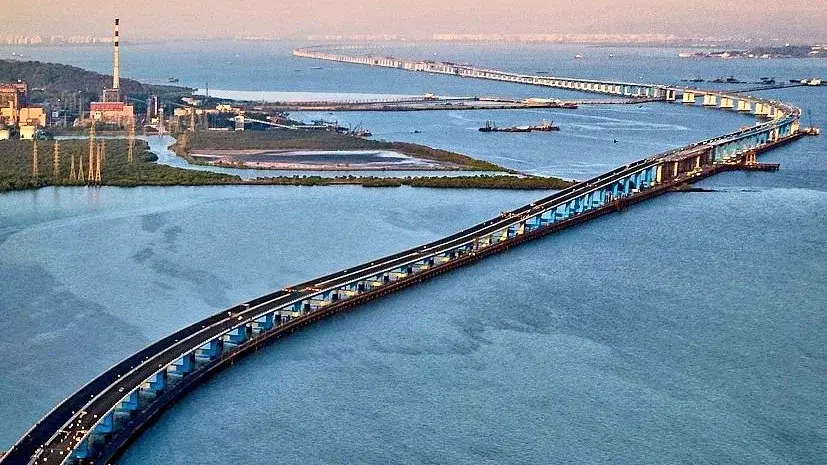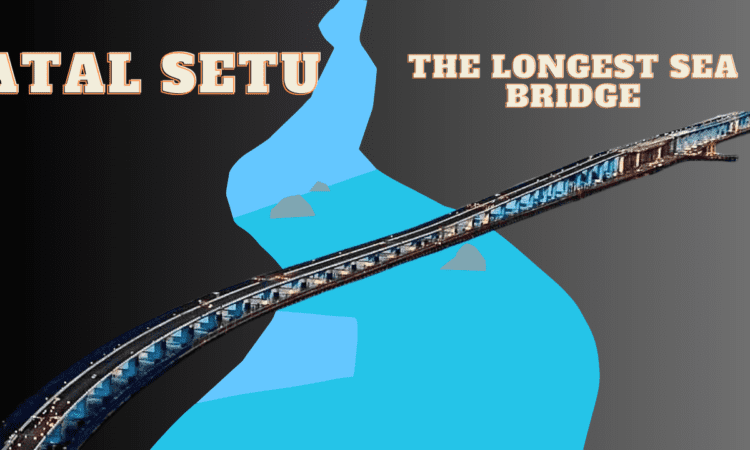Table of Contents
About:
Mumbai Trans Harbour Link (MTHL) was inaugurated by Prime Minister Narendra Modi on Friday, 12th of January and the country’s longest sea bridge with six lanes.
Thank you for reading this post, don't forget to subscribe!The length of the Atal Setu is 21.8 km and has been named after the late former prime minister, Atal Bihari Vajpayee. The construction cost of the bridge has been around Rs 18,000 crores and marks a significant infrastructure achievement of the country.
According to reports, it is said that the quantity of steel used in the construction of the bridge is equivalent to the weight of 500 Boeing aeroplanes also 17th times the weight of the Eiffel Tower.

Image credit: Adda 24×7
Below are a few technologies used during the construction of the engineering marvel- Atal Setu–
Noise reduction measures:
The bridge has been incorporated with side noise barriers and silencers which enables to reduction of the overall noise impact of the structure.
Eco-friendly lighting:
The LED lighting system has been empanelled in such a way that the aquatic environment doesn’t get disrupted.
Open road tolling:
The bridge is equipped with electronic toll collection (ETC) technology, which automatically collects the toll fares from the vehicles eliminating the requirement to stop at toll booths and reducing traffic congestion.
Earthquake-resistant:
There has been use of 254 numbers of base isolators in the bridge which can absorb the shocks caused due to seismic forces thus reducing the risk of collapse and designed to withstand tremors of up to 6.5 Richter scale.
Real-time traffic info:
Display screens have been added in the Atal Setu to provide real-time traffic conditions to the drivers, driving on the Atal bridge so that they remain aware of the condition of the road which contributes to being a very important safety feature.
Steel deck:
Steel plates have been used in the deck of the bridge supported by a network of steel beams reducing the weight of the bridge when compared to concrete decks and also increasing the capacity to withstand wind loads.
Longer spans:
The use of steel deck in the bridge allowed to increase in the span of the piers resulting in the construction of less number of piers which not only enhanced the looks of the bridge but also reduced the construction cost.
Conclusion:
Finally, Atal Setu is more than just a bridge linking two sites; it is a symbol of development, unity, and engineering marvel. Its elegant arch crossing the river not only eases the journey but also serves as a testimony to human creativity and perseverance. Atal Setu is more than simply concrete and steel; it provides a lifeline for communities, establishing relationships and smoothing out travels. As we travel its length, we are reminded that infrastructure, properly planned with both functionality and aesthetics in mind, can improve lives and leave lasting imprints on the fabric of our common human experience.
- FASTag KYC update: Updation of KYC for FASTag before 31st January; Step-by-step Process:
- Tejas vs. Thunder: China’s “Wrestles,” JF-17 With a fighter deal with Nigeria, India’s LCA Tejas is fully engaged in backchannel diplomacy.
- Real Madrid Victory: At Las Palmas, Aurelian Tchouameni gives Real Madrid a late victory.
- Bharat Ratna: Must-know Facts and Important FAQs on the Bharat Ratna Award
- Klopp is leaving Liverpool at the end of the season
